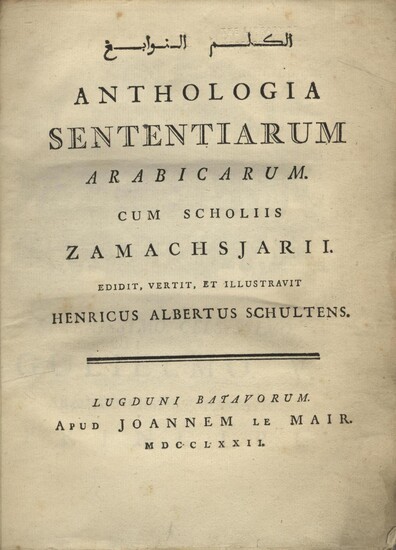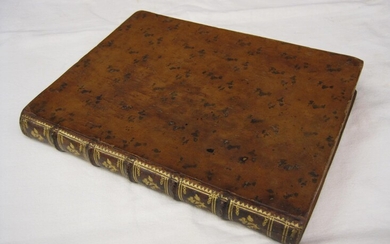Anthologia Sententiarum Arabicarum. Cum Scholiis Zamachsjarii.
By Al-Zamakhshari, Abu al-Qasim Mahmud Ibn Umar (1075-1144) / Edited by Henricus Schultens.
[18], 171 pages, [1], Latin and Arabic text, period paper wrappers, rubbed round edges, new spine strip, small library blind stamp at top of title page, occasional spotting, contents quite clean overall being an untrimmed copy very much as-issued with wide margins, first edition, translated and edited by Henricus Schultens. The sources of Arab proverbs are numerous and old, some reaching far back into history. As early as 1107, for example, Abu al-Qasim Al-Zamakhshari completed a book of proverbs already old then. He called it Al-Mustaqsa fi Amthal al-Arab (The Sought After Arabic Proverbs), it was in two volumes and included 3461 proverbs, along with notes on their sources and their meanings. They can be compared with the "Durham Proverbs" which are thought to be the earliest known collection of Anglo-Saxon sayings and take up, according to the Oxford Dictionary of English Proverbs, a mere "three leaves . in the middle of an 11th century hymnal." Even earlier, a scholar named Ahmad ibn Muhammad al-Maidani had published a book containing 4766 proverbs in an alphabetical order. It was called Majma' al-Amthal (A Collection of Proverbs), and according to a note in the author's introduction, the work was based on 50 other books containing proverbs. While other nations were still coining phrases, the Arabs were compiling them. The richest source of Arabic proverbs is, of course, the Qur an. There are few verses (Ayah) that have not been used as proverbs and to this day they permeate conversation, literature, speeches and even legal decisions. This work is a considerable collection of maxims and Arabic proverbs compiled by Al-Zamakhshari and presented both in Arabic and Latin by Schultens (1749-1793), who was a professor of Hebrew and Arabic and taught in London, Amsterdam, and Leiden. Provenance: Bookplate of Victor De Guinzbourg to front pastedown. From the collection of Robert Easton. Bibliographic references: Duplessis 74, for 1773 edition; Sarton II, 271-272 Size: 8vo.
Published by: Typographia Dammeana for Joannem Le Mair, Leiden, 1772
Vendor: FOLIOS LIMITED
Buy Now on
By Al-Zamakhshari, Abu al-Qasim Mahmud Ibn Umar (1075-1144) / Edited by Henricus Schultens.
[18], 171 pages, [1], Latin and Arabic text, period paper wrappers, rubbed round edges, new spine strip, small library blind stamp at top of title page, occasional spotting, contents quite clean overall being an untrimmed copy very much as-issued with wide margins, first edition, translated and edited by Henricus Schultens. The sources of Arab proverbs are numerous and old, some reaching far back into history. As early as 1107, for example, Abu al-Qasim Al-Zamakhshari completed a book of proverbs already old then. He called it Al-Mustaqsa fi Amthal al-Arab (The Sought After Arabic Proverbs), it was in two volumes and included 3461 proverbs, along with notes on their sources and their meanings. They can be compared with the "Durham Proverbs" which are thought to be the earliest known collection of Anglo-Saxon sayings and take up, according to the Oxford Dictionary of English Proverbs, a mere "three leaves . in the middle of an 11th century hymnal." Even earlier, a scholar named Ahmad ibn Muhammad al-Maidani had published a book containing 4766 proverbs in an alphabetical order. It was called Majma' al-Amthal (A Collection of Proverbs), and according to a note in the author's introduction, the work was based on 50 other books containing proverbs. While other nations were still coining phrases, the Arabs were compiling them. The richest source of Arabic proverbs is, of course, the Qur an. There are few verses (Ayah) that have not been used as proverbs and to this day they permeate conversation, literature, speeches and even legal decisions. This work is a considerable collection of maxims and Arabic proverbs compiled by Al-Zamakhshari and presented both in Arabic and Latin by Schultens (1749-1793), who was a professor of Hebrew and Arabic and taught in London, Amsterdam, and Leiden. Provenance: Bookplate of Victor De Guinzbourg to front pastedown. From the collection of Robert Easton. Bibliographic references: Duplessis 74, for 1773 edition; Sarton II, 271-272 Size: 8vo.
Published by: Typographia Dammeana for Joannem Le Mair, Leiden, 1772
Vendor: FOLIOS LIMITED




